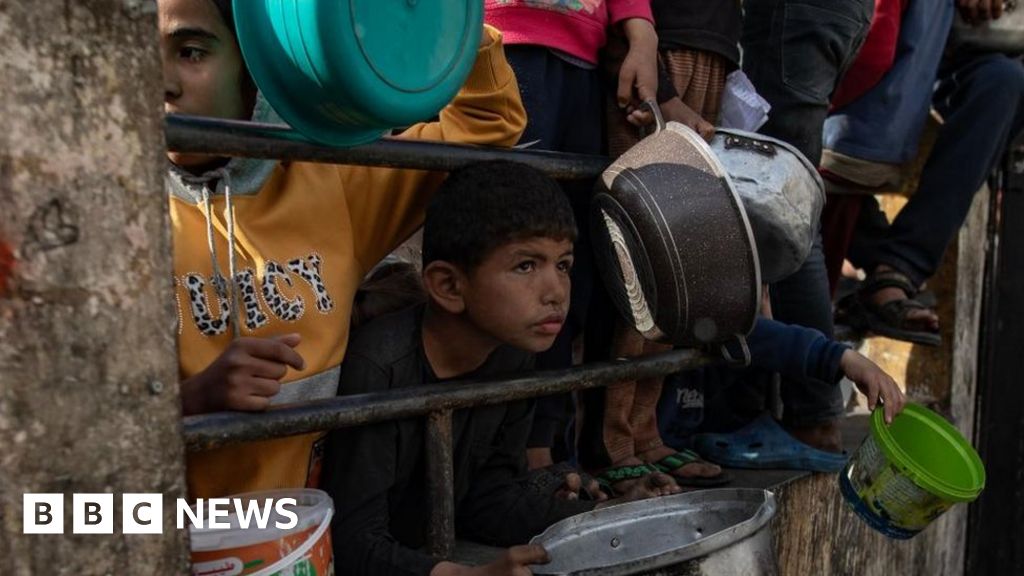
Image source, EPA-EFE/REX/Shutterstock
German Chancellor Olaf Scholz called for more aid to be delivered to Gaza on the ground, and criticized Israel's plans to launch a large-scale attack on the southern city of Rafah.
Israel previously defended its plans to attack Rafah, describing it as necessary to end Hamas' presence in the Strip.
Schultz's statements come a day after the first naval aid package arrived in Gaza.
The shipment contained 200 tons of food, including rice, oil and dates.
The mission was carried out by the American charity World Central Kitchen (WCK) in cooperation with the United Arab Emirates.
Aid has been flowing slowly into Gaza since the beginning of the war, which began after Hamas gunmen attacked southern Israel on October 7, killing about 1,200 people and taking 253 hostage.
Since then, more than 31,400 people have been killed in Gaza, according to the Hamas-run Health Ministry.
Speaking to reporters ahead of a visit to the Middle East, Mr. Schulz described the situation in Gaza as “difficult,” adding that “it is essential that aid reaches Gaza on a broader scale now.”
He added that he would raise this issue during talks with his counterparts in the region.
Schulz went on to stress that Germany is concerned about military developments in Rafah, located on the border with Egypt.
More than a million people from other parts of Gaza live there.
“There is a risk that a large-scale attack in Rafah could lead to many civilian casualties, which must be avoided at all costs,” Schulz said.
This comes after Israeli Prime Minister Benjamin Netanyahu approved plans for a military operation in Rafah, adding that the army is preparing to evacuate civilians.
In defense of its strategy, Israel says that Hamas cannot be completely removed from Gaza without targeting Rafah.
The international community has criticized Israel's plans, and the United Nations and the United States have also warned that a large-scale attack in Rafah could be disastrous.
Speaking on Thursday, the Israeli military said it intends to move displaced Palestinians in Gaza to what it called “humanitarian islands” in the center of the Strip. It is not clear what the “islands” will look like or how they will function.
The population of Gaza suffers from deprivation and is in dire need of food, and the United Nations warned earlier that the Strip is on the verge of famine.
The Coordination of Government Activities (COGAT), the Israeli body that coordinates humanitarian aid to Gaza, says that so far this month an average of 126 food trucks have entered daily. She says that this number exceeds the 70 trucks carrying specifically food supplies that entered Gaza before the war. About 500 trucks entered Gaza every day before the war.
Getting aid by land is most effective. But military operations and the collapse of social order have severely hampered aid distribution, prompting some countries to try alternative routes – by air and sea.
Israel denies obstructing the entry of aid into Gaza and accuses relief organizations of failing to distribute it.
Meanwhile, Israel and Hamas could meet in Doha for talks on a possible truce agreement on Sunday. Hamas said it had provided a “comprehensive vision” to the mediators.
But Netanyahu accused the group of making “unrealistic” demands. However, he agreed to send Israeli negotiators to Qatar.
In an interview with the BBC on Saturday, Dr. Margaret Harris, a spokeswoman for the World Health Organization, said it was “good news” to hear that there was movement towards a ceasefire.
She described this measure as the “only response” to the current situation in Gaza. Dr. Harris said her colleagues on the ground had never seen such misery before.
“They have never seen the speed, the horror and the misery that people are experiencing there, living in extreme crowding, starving in places covered in human excrement, unable to clean the place because we cannot even bring in chlorine.”




More Stories
Journalists convicted in Hong Kong sedition case
Stand News: Hong Kong journalists convicted of sedition in case critics say highlights erosion of press freedom
Shark decapitates teen off Jamaica coast